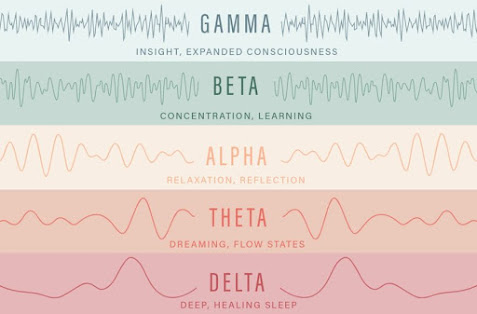The effects of anaesthetics dramatically alter the path of brain waves.
Consider the conscious brain as a sea boiling with the collisions and dispersals of waves of all sizes and shapes, whirling around and pouring across in a variety of directions. Imagine an ocean liner barreling through, levelling everything in its wake with its mighty, parting wake. According to a recent research, unconsciousness produced by the regularly prescribed medicine Propofol has a metaphorical impact on higher frequency brain waves, sweeping them aside and, as a result, sweeping awareness away as well.
Propofol significantly modifies how various frequencies of brain waves flow over the brain's surface, or cortex, according to a research published in the Journal of Cognitive Neuroscience by MIT scientists at The Picower Institute for Learning and Memory. Whereas conscious brains have a mix of waves of various frequencies rotating or travelling straight in various directions, brains under propofol anesthesia have powerful, very low frequency "delta" waves that roll straight outward in opposite directions rather than slowly rotating around central points as they do during consciousness. In the meanwhile, higher frequency "beta" waves grew fewer and more erratically organized, only going in directions not dominated by the rising delta waves.
SPONSORED LINK
- wonder leaf CBD oil for penile growth
- wonder leaf CBD oil near me
- keto max science
- Green roads CBD Oil
- wonder leaf CBD oil
- keto max science Canada
Get More Information
- https://www.facebook.com/wonderleafcbdoils/reviews
- https://techplanet.today/post/wonder-leaf-cbd-oil-reviews-2022-how-to-use-and-its-pros-and-cons
- https://techplanet.today/post/keto-max-science-reviews-2022-how-does-it-work-in-weight-loss
- https://techplanet.today/post/keto-max-science-reviews-2022-how-to-use-and-its-pros-and-cons
- https://techplanet.today/post/green-roads-cbd-oil-reviews-2022-how-to-use-and-its-pros-and-cons
- https://www.facebook.com/Keto-Max-Science-Canada-101759245942823
- https://www.facebook.com/Green-Roads-CBD-Oil-101929482569948/
As they coordinate the activity of brain cells throughout the parts of the brain they cover, travelling waves are thought to serve a variety of vital activities. These include retrieving information from memory and storing it until it is needed for cognition. They may also help with perception and serve as a time-keeping mechanism in the brain. According to lead author Earl K. Miller, Picower Professor of Neuroscience at MIT's Department of Brain and Cognitive Sciences, "the results demonstrate how deeply anaesthesia modifies the state of the state of the brain as it produces and sustains unconsciousness."
"Propofol substantially alters the rhythms that we connect with higher cognition," Miller added. "During awake, the beta travelling waves are pushed aside and diverted by delta travelling waves that have been changed and made more forceful by the anaesthetic." "Like a bull in a china shop, the deltas come through."
The results, according to co-senior author Emery N. Brown, show that anaesthetic medications may affect the brain in a variety of ways.
Brown, an anesthesiologist at Massachusetts General Hospital and Edward Hood Taplin Professor of Computational Neuroscience and Health Sciences and Technology at MIT, said, "The travelling waves generated by propofol help us appreciate that there are many dynamical phenomena that anaesthetics create that can contribute to altered arousal states such as unconsciousness." "It is thus illogical to believe that all anaesthetics have the same mechanism of action."
Sayak Bhattacharya, a postdoctoral Picower Fellow in Miller's lab, led the work by re-analyzing data from two rats that were anaesthetized with propofol, remained in that condition for a period, and then were brought back to awareness. This is significant, according to Bhattacharya, because although travelling waves have been identified in anaesthetized people before, this is one of the first studies to follow them all the way through the process of losing and recovering consciousness.
"In the same experiment, no research has studied how travelling waves alter from awake to anaesthetic and back to awake," he stated. "We continually examined how these waves behaved while the animals were awake, how they changed when they lost consciousness, and how they changed again when they recovered awareness — all in the same animals, over the course of a continuous experimental session." This enabled us to see how the brain connections that create the waves were changed in real time."
The lab's initial examination of the data collection, released in 2021, showed a significant shift toward delta waves but didn't assess how fast the waves travelled.
Bhattacharya and co-authors discovered substantial alterations in frequency, wave direction, speed, structural organisation, and planar vs. rotational shape in their current study.
The authors noted that "low-frequency delta (1 Hz) waves rose whereas higher-frequency (8-30 Hz) waves decreased." "The slow-delta waves got more spatially structured as they accelerated. They grew more flat (and less spinning), and mirror-image waves going in opposing directions became more prevalent. Slow-delta waves dominated in whichever directions they came in following loss of consciousness. Despite increasing [wave] strength, higher-frequency waves reduced and lost structure following loss of consciousness, and flowed preferentially in locations where slow-delta waves were less common."
When the animals recovered consciousness, their wave patterns all went back to where they were before the propofol was given. The substantial link between these two regimes (unrestricted beta before or after anaesthesia vs. delta dominance during anaesthesia) and the state of consciousness, according to Bhattacharya, clearly supports a link.
"We suggest that the abrupt breakdown of beta travelling waves, as well as their redirection, may contribute to loss of consciousness during propofol anaesthesia," he stated.
Notably, the data reveal a key distinction between anaesthesia and sleep (a widespread misunderstanding is that the two states of unconsciousness are comparable). Delta waves move in a rotating pattern during sleep, which may offer the time needed to generate the "spike timing dependent plasticity" required for integrating memories of events gathered during the day. Delta waves, on the other hand, become planar rather than spinning when given propofol, breaking this memory-aiding process and depriving the brain of a crucial sleep function.
Jacob Donoghue, Meredith Mahnke, and Scott Brincat are among the paper's other authors, in addition to Bhattacharya, Miller, and Brown.
The study was financed by the JPB Foundation, the National Institute of General Medical Sciences, and the Office of Naval Research.


Comments
Post a Comment